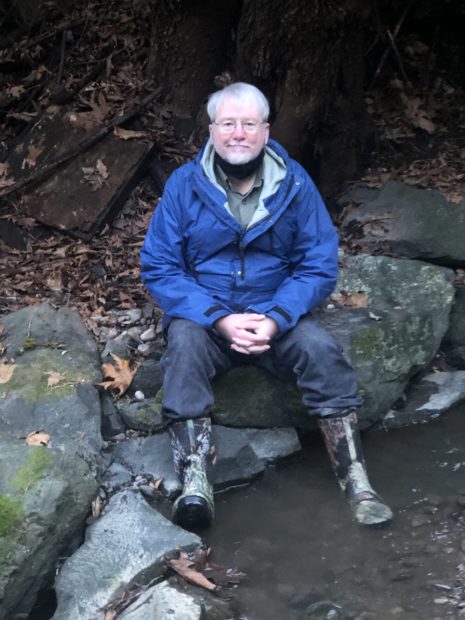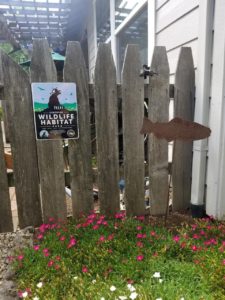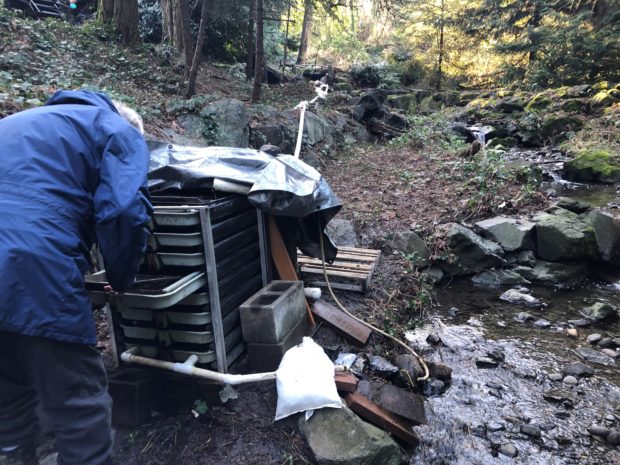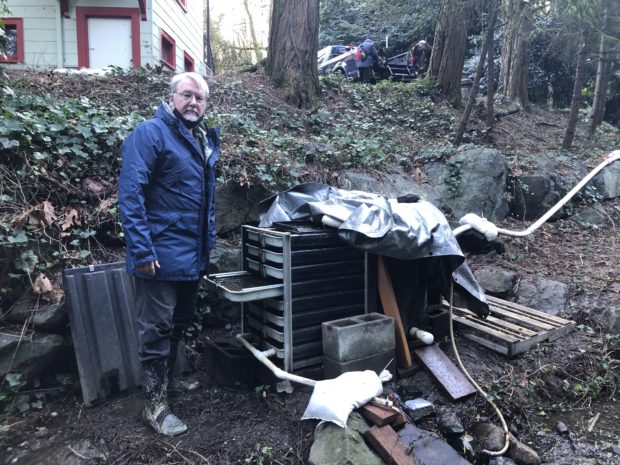We have much more to do and your continued support is needed now more than ever.
Building a Conservation Legacy, One Backyard at a Time
Volunteer Don Scalon may not have been born in the Pacific Northwest, but his commitment and dedication to the region’s native habitat and species is as inherent and steadfast as true north.

Growing up in eastern Michigan—right outside of Flint, to be precise—Don Scanlon’s childhood was cultivated by years spent on his grandparents’ farm and pheasant hunting with his father, where he learned to navigate the complex stream and creek systems.
“It eventually got to the point that I didn’t need directions, I could just look at whichever stream or creek I was on and know where I was in relation to everything else.”
This unbridled immersion and access to the wilderness during his youth instilled in Don a lifelong passion for the environment, a passion he brought with him when he moved half-way across the country, settling in the Pacific Northwest over 30 years ago. Don became involved with a group of individuals focused on maintaining and restoring local habitat around Tukwila, Washington, where he lived. They wanted to reignite the public’s awareness and appreciation for the natural world. Through collaboration with the National Wildlife Federation’s Certified Community Wildlife Habitat program, they made it happen. Tukwila would become the first certified community in Washington State in 2002.
Habitat Steward

Through years of outreach, Don and the team educated, helped to support the certifications of houses, businesses, and public spaces as wildlife habitats, and organized habitat restorations efforts throughout their community. Years of hard work and volunteering brought to life the annual Tukwila Backyard Wildlife Festival, hosted by the Tukwila Parks and Recreation Department.
“They are amazing, devoted people,” said Don of the Tukwila Community Wildlife Habitat Team. We came together, sharing a common cause of protecting our local habitat.” In the years following the city’s certification, Don continued his work, teaching butterfly classes, providing garden tours in his yard, and tending to the habitat he had built there.
Localized Restoration
Don’s inner habitat steward then pushed him in a new direction. This time, he took on a Coho salmon incubator project along the South Gate Creek that runs through his backyard and connects to the Duwamish River. Receiving the salmon eggs/fry in mid-December, Don would monitor them until they were mature enough to be released into the creek.

“Until about 12 years ago, this all used to be cement,” Don says, pointing to the mostly shaded stream, full of cold, clear water cascading along from one pool to the next, weaving under and around boulders and fallen tree trunks. “It was really impressive how the city worked to restore this creek to a much more natural state, much better for the salmon.”
Native salmon spawning streams are essential to the survival of the iconic species, whose numbers have continued to decline in recent years and decades. The focused, localized restoration efforts like those of Don are critical in the broader regional effort to restore salmon runs. He recalls his most cherished volunteering memories during an event with the local boy and girl scouts:
“It was really great watching how excited the kids (and adults) got about releasing the salmon into the creek. Opportunities to learn where a part of the natural world begins is really special; being able to witness it first hand and participate is really inspiring. That was a very memorable and wonderful project.”

Several years ago, Don retired and made the decision to return to his farming roots on a mid-sized, 42-acre farm in Oakville, Washington. He hopes to grow grain and knows he’s got his work cut out for him.
“I’ve had the toughest time trying to find and purchase farm equipment, and I need to learn how to operate a combine, but I’m excited.”
Don’s departure created a vacancy for the role of South Gate Creek’s salmon incubator, but not for long. While acknowledging it would be impossible to replace him, Mayor of Tukwila, Allen Ekberg, served as a temporary interim supervisor of the project before it was handed off to the care of a new volunteer. It is now in the hands of a new caretaker, which will help to ensure Don’s legacy of habitat and salmon restoration, community engagement, and volunteerism remain vibrant in Tukwila in the years to come.
Get Involved
If you’d like to get more involved with the Community Wildlife Habitat program, please contact Cierra Hunziker, AmeriCorps Member at waeducation@nwf.org. Learn how you can Garden for Wildlife.
Interested in learning more about how to protect and advocate for local salmon? Contact Jacqueline Koch at kochj@nwf.org..





















